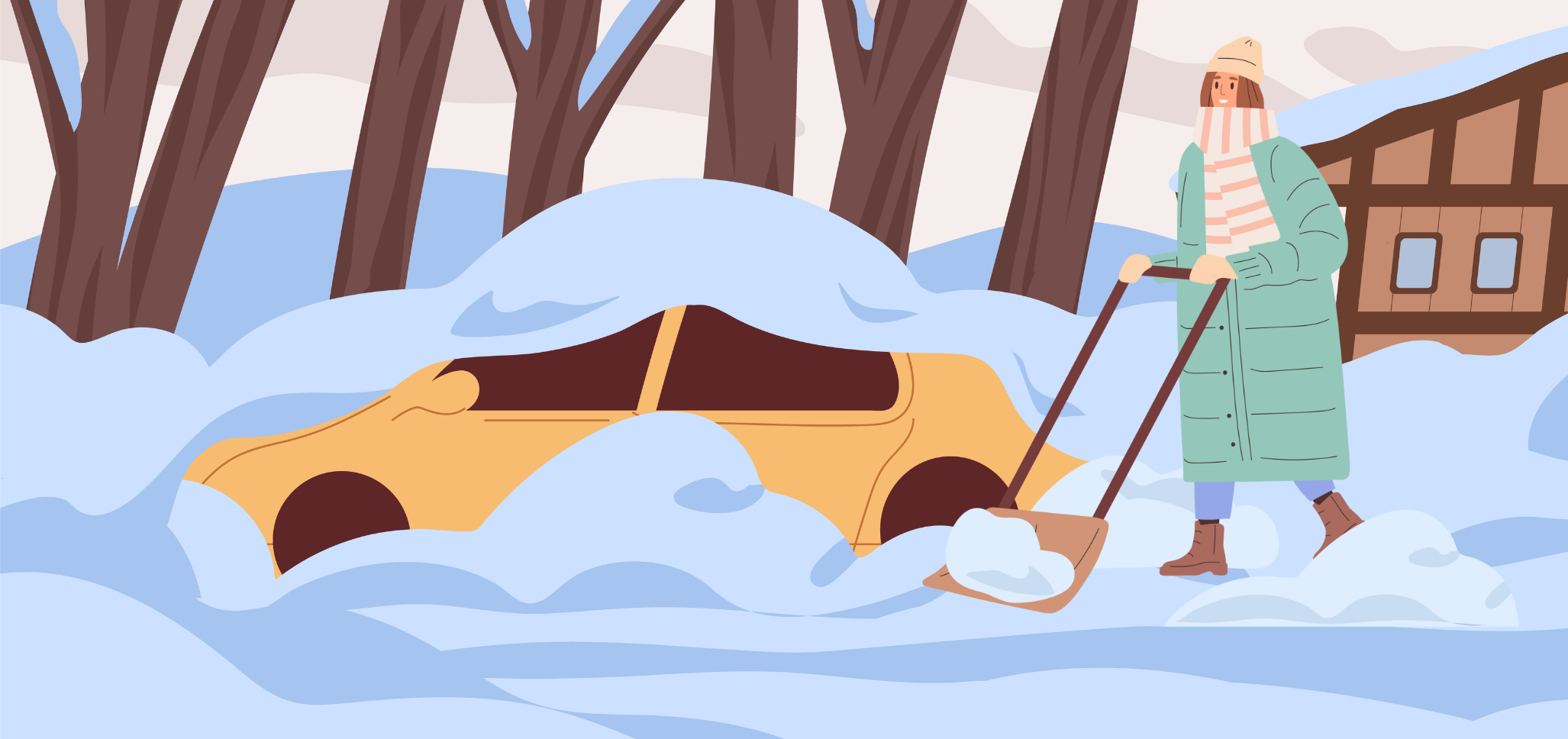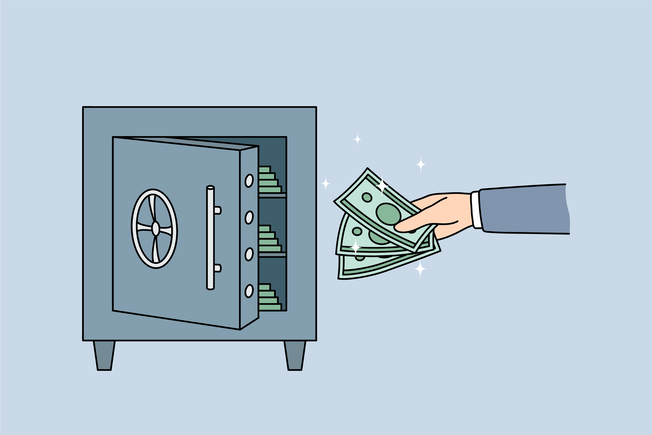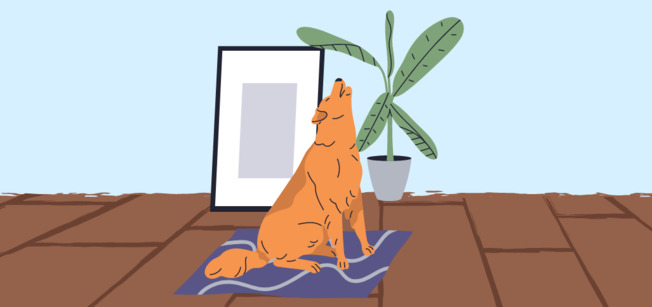
Do I Need to Shovel Snow as a Renter?

By Lilly Milman
Nov 30, 2023
Depending on where you live, you’ve either already had your first snow of the season — or you’re expecting it soon. When you’re a kid, snow days bring with them cherished memories of sledding and hot cocoa. As an adult, however, the thought of even a few flakes falling may leave you feeling dread. After all, traffic gets backed up, cars parked on the street need to be dug out of snow piles, and shoveling is no easy task — which begs the question: As a renter, do you need to shovel snow?
In this guide, we tell you everything you need to know about your responsibilities as a renter when it snows.
Do I need to shovel snow as a renter?
Ultimately, this depends on your lease. There may be a clause in your lease that requires you to shovel your own steps or portion of the sidewalk. However, this is more common if you are renting a unit in a duplex or triplex, a single-family home, or an in-law apartment. If you are renting an apartment in a large apartment building or complex, it’s more likely that the property management company will take care of any shoveling of common areas.
What happens if I don’t shovel snow?
The consequences for not shoveling snow — even if your lease includes a clause that requires you, as the renter, to be responsible for shoveling — will depend on your local state and city laws. If your state or city’s laws dictate that the landlord is responsible for shoveling snow, then the landlord — not the tenant — will be fined by the city despite what the lease says.
However, this is why it’s important to read the terms of your lease carefully: There may be a section on nonstandard rental provisions in your lease, which dictates which fines the tenant will be responsible for due to noncompliance with local laws. If this is the case, then even if your landlord pays a fine for not shoveling on your behalf during the winter, they may take this fee out of your security deposit down the line.
What are my state’s laws on shoveling snow?
Each state will have different snow removal policies. They exist on a spectrum: In Alabama, for example, there are no written snow removal laws, while in Massachusetts, it’s the landlord’s responsibility to clear snow and ice from their property (including sidewalks and entrances to the property) within a certain timeframe. There are also many city-level snow removal ordinances: For example, in Madison, WI, property owners and residents are required to remove snow from the sidewalk in front of their property by noon the day after the snow stopped falling and will be fined if they don’t. We recommend looking into your specific state’s laws to better understand what your responsibilities for snow removal are as a property owner or renter. There, you will also find who is responsible in the case of a personal injury due to failure to remove snow.
How do I shovel snow?
If you are responsible for shoveling snow at your residence, then it’s time to get your gloves on and get to work. Once the snow has stopped falling, you will want to go outside and start clearing the entrances to your property as well as the public sidewalk directly in front of it.
If you have a snow pusher, which is a wide shovel made for pushing snow out of the way, then you can start by using it to clear the sidewalk. Just make sure you don’t push snow onto someone else’s property, onto the roadway, or around a fire hydrant or crosswalk, as many local ordinances require that public areas be kept clear. If you were able to clear the snow down to the sidewalk or to a bottom layer of ice, then you can sprinkle ice melt or deicing salt to melt the rest. You can use the snow pusher or a smaller snow shovel to clear smaller areas, like the stairway or walkway into your rental property, as well as the ice melt for ice removal in these areas.
What do I need to shovel snow?
The last thing you’ll want to do when it starts snowing is drive to the hardware store to get snow removal tools. Not only will the driving conditions be dangerous, but if the store is sold out, you may be fined for failing to remove snow around your property. So, you’ll want to keep a few things around in preparation for the first snowfall of the winter months. We recommend:
- A snow shovel or snow pusher, which can help you clear your sidewalk
- A pair of warm, waterproof gloves
- Ice melt or deicing salt to sprinkle on the sidewalk after you’ve cleared it of snow.
The Bottom Line
Shoveling is the least fun part of any snow day, but it must be done. One of the benefits of being a renter rather than a homeowner, though, is that you may not even be on the hook for removing the snow in front of your residence. Most likely, you will only be responsible for shoveling snow if you live in a duplex or triplex, a single-family rental, or an in-law apartment. Your lease agreement will dictate whether or not you, as the tenant, are responsible for shoveling snow. Municipality and state snow removal laws will also determine who will be fined for failing to remove snow.
Top cities
Atlanta Apartments
1,671 apartments starting at $550/month
Austin Apartments
4,908 apartments starting at $500/month
Baltimore Apartments
1,259 apartments starting at $475/month
Boston Apartments
3,260 apartments starting at $950/month
Charlotte Apartments
2,815 apartments starting at $575/month
Chicago Apartments
6,031 apartments starting at $638/month
Dallas Apartments
5,610 apartments starting at $595/month
Fort Worth Apartments
2,621 apartments starting at $500/month
Houston Apartments
4,935 apartments starting at $600/month
Las Vegas Apartments
1,106 apartments starting at $795/month
Los Angeles Apartments
11,201 apartments starting at $642/month
Miami Apartments
616 apartments starting at $923/month
Milwaukee Apartments
1,164 apartments starting at $545/month
New York Apartments
5,157 apartments starting at $1,050/month
Oakland Apartments
769 apartments starting at $850/month
Orlando Apartments
839 apartments starting at $940/month
Philadelphia Apartments
3,008 apartments starting at $500/month
Phoenix Apartments
3,896 apartments starting at $600/month
Pittsburgh Apartments
769 apartments starting at $475/month
Portland Apartments
2,124 apartments starting at $750/month
Raleigh Apartments
1,207 apartments starting at $700/month
San Antonio Apartments
3,495 apartments starting at $574/month
San Diego Apartments
2,756 apartments starting at $650/month
San Francisco Apartments
481 apartments starting at $830/month
San Jose Apartments
421 apartments starting at $1,100/month
Seattle Apartments
3,033 apartments starting at $650/month
Tampa Apartments
776 apartments starting at $779/month
Washington DC Apartments
2,275 apartments starting at $910/month


